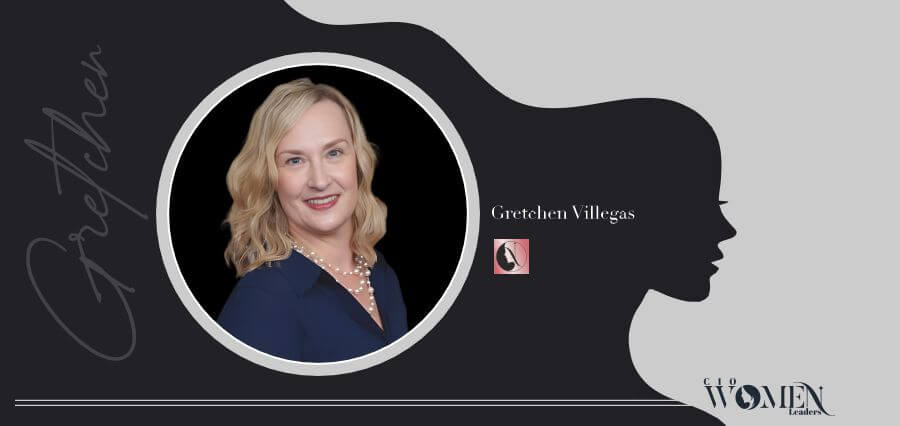A remote village, nestled in the mountains of South America, embodies the vibrancy of the community, matched only by the challenges they face. In this picturesque setting, Gretchen Villegas, a seasoned leader with over 25 years of experience, embarked on her journey towards transformative change.
As a Peace Corps Volunteer, Gretchen witnessed firsthand the resilience and potential of marginalized communities. This experience ignited her passion for creating sustainable solutions to poverty and fostering pathways to dignity. With a career spanning 15+ years managing USG-funded programs across Latin America and Africa, Gretchen has been at the forefront of innovative program designs aimed at empowering vulnerable households.
With a portfolio totalling over $320M+, Gretchen’s impact extends far beyond borders. Her expertise in partnership development has cultivated relationships with industry giants like Cargill and Walmart, as well as esteemed organizations such as USAID and the Gates Foundation. Through strategic collaborations, she has leveraged resources to scale initiatives and maximize impact.
Gretchen’s bilingual proficiency in Spanish and English enables her to navigate diverse landscapes seamlessly. From Colombia to Cambodia, she has left an indelible mark driving organizational strategy, designing projects for systemic change and implementing rigorous impact metrics. At the core of her leadership philosophy lies a commitment to people and partnerships. She excels in cultivating mentorship programs, fostering growth among her team and developing key alliances with corporations, foundations and academic institutions.
With specialties ranging from fundraising strategies to inclusive market systems, Gretchen embodies versatility and expertise. Her track record speaks volumes, marked by a dedication to excellence and an unrelenting endeavor for transformative outcomes.
Let’s delve into Gretchen’s world where challenges abound and she is leading the charge towards a more equitable and resilient future!
The Holistic Blueprint
In her career’s early stages, Gretchen learned a vital lesson—the efficacy of a holistic approach in designing Global Development programs for vulnerable communities. She emphasizes that a holistic approach is crucial for long-term impact. This methodology involves forging partnerships with organizations and businesses, both locally and globally, that share the program’s mission and demonstrate tangible impacts on ‘People, the Planet and Profits.’
Her epiphany came while working in Malawi’s central region with dairy cooperatives comprising vulnerable smallholder farmers. Recognizing the systemic gaps hindering these farmers’ access to essential resources, Gretchen realized the imperative of addressing social good, environmental sustainability and financial viability simultaneously.
A holistic strategy necessitated collaborating with a global business willing to invest in high-yielding dairy cows, a local dairy processing enterprise offering training on milk quality and environmental stewardship along with the establishment of local businesses providing crucial services like veterinary care, business planning and feed supply.
The true success lay in aligning all partners’ values and ensuring that every endeavor generated social benefits, protected the environment and yielded profits. As the Program Designer and Director, Gretchen’s role was to maintain alignment and measure and communicate impact continually. “The outcome exceeded my expectations,” she reveals, citing increased funding from partners that enabled unprecedented scalability.
Elevating the Triple Bottom Line – People, Planet and Profit – proved transformative, fostering remarkable scale and sustainability. “It’s a principle I staunchly believe in, backed by tangible evidence,” Gretchen asserts. She stresses that achieving this balance requires a consortium of like-minded entities spanning businesses, social enterprises and global/local organizations, all committed to long-term success.
Today, Gretchen embeds this approach in every program she contributes to, recognizing its capacity to effect enduring change. “It’s not just theory—it’s a proven blueprint for sustainable development,” she states, highlighting the indispensable role of collaborative efforts in realizing the Triple Bottom Line’s potential.
Listening to Local Voices
During her time with the Peace Corps, Gretchen gained invaluable insights into the importance of listening to local leadership and understanding their perspectives on problems and solutions. “Cultural intelligence is a skill that’s acquired,” she emphasizes, noting that different contexts shape varying perceptions of issues and remedies.
In her role as a facilitator, Gretchen accentuates the significance of external parties actively listening, providing resources and collaborating with local communities to address challenges effectively. “Local culture, leadership and innovation are powerful forces,” she states. “They simply need to be recognized and supported with resources to yield results.”
Carrying this cultural intelligence forward, Gretchen believes it has been instrumental in her career achievements. She underlines its pivotal role in every endeavor she undertakes, recognizing it as a secret to her success. Through embracing local perspectives and fostering collaboration, Gretchen continues to make meaningful contributions to communities worldwide.
Community-Driven Impact
In Gretchen’s view, a globally owned vision empowers those directly involved in activities and impact to lead the way. “I always start by engaging with the communities where the work happens,” she explains, “asking critical questions about their needs, problems, desires, and potential impact.” Over her extensive career spanning more than 25 years, Gretchen has consistently found a common thread—There are always areas of improvement for the People, the Planet and Profits. This realization has driven her strategies majorly focusing on the Triple Bottom Line.
After gathering insights from local voices, Gretchen ensures widespread dissemination within the central organization funding the strategy. “Strategy involves cross-departmental dialogues,” she notes, “digging into each challenge and identifying common goals.”
These common goals serve as the foundation for defining a goal and guiding discussions on actions needed to achieve the desired outcomes. According to Gretchen, true alignment between the Board of Directors, frontline workers and asset managers is paramount for success.
While the approach to achieving impact evolves with changing circumstances, Gretchen emphasizes the importance of maintaining alignment. “If alignment remains consistent,” she asserts, “the North Star is undoubtedly reached.” This adaptive yet steadfast approach underscores Gretchen’s commitment to driving meaningful change and realizing impactful outcomes.
Achieving Audacious Goals
“In my experience,” Gretchen asserts, “the first step is to define an audacious goal.” Once set, she advises creating a financial model that outlines the costs and timelines for achieving it, incorporating various delivery models including partnerships with businesses. “Too often,” she laments, “organizations assume funds will come without a solid financial plan.”
Gretchen highlights the need for international NGOs to operate like businesses, prioritizing impact while safeguarding the Triple Bottom Line – People, Planet and Profit. She stresses the importance of developing a comprehensive model that not only demonstrates impact but also tracks costs in real time allowing for adjustments and scalability. “Business partners are more inclined to invest when they see rigorous financial analysis,” she notes.
Drawing from her fundraising experience, Gretchen highlights the significance of quantifying the costs associated with environmentally sustainable practices, social empowerment initiatives and essential business functions. “Donors, businesses and foundations are attracted to well-designed programs that map out costs and manage impact through robust reporting mechanisms,” she explains.
In today’s nonprofit landscape, fundraising is increasingly complex, especially for those aiming to secure substantial funds for scaling up impactful initiatives. Gretchen’s approach accentuates the necessity of strategic financial planning and transparent reporting to attract diverse funding sources and drive meaningful change.
Accountability in Action
“A program design isn’t complete without providing impact projections over its life,” Gretchen emphasizes. These projections, she explains, are grounded in real evidence used to form assumptions. “Once the program is underway,” she continues, “these projections become part of a monitoring plan.”
Gretchen stresses the importance of regular data collection, analysis and review to inform management decisions. She warns that managing without data reviewed at least quarterly is likely to fall short of results. She takes an active role in teaching her teams to set up monitoring plans and guides them in collecting and analyzing data.
The analysis, according to Gretchen, leads to actions such as scaling up, pivoting, or adjusting activities based on real-time feedback. “These actions often relate to social benefits for People, environmental impacts on the Planet and increases in Profits,” she adds. If positive impacts aren’t evident across all three areas, Gretchen advocates for implementing changes.
Even if donors don’t explicitly require assessments across all three pillars—People, Profit and Planet—Gretchen underscores the expectation that Global Development initiatives should do no harm. “Assessing impacts on all fronts is crucial,” she shares, “whether intentional or unintentional.” This approach ensures accountability and sustainability in global development efforts.
Guiding Principles
“Cultural intelligence from my Peace Corps days sticks with me,” Gretchen reminisces. “I listen, gather information, ask questions, and avoid assuming I have all the answers.” This approach, she explains, has guided her work across diverse regions like Africa, Asia and Latin America, all aiming for the same results.
“For Global Development,” Gretchen emphasizes, “flexibility is essential.” She underscores the importance of adapting strategies to fit each context prioritizing impact while allowing those closest to the situation to determine the approach. As a facilitator, Gretchen ensures access to resources and remains focused on outcomes.
Her role, she describes, is akin to steering a ship. “I keep us on track by ensuring activities align with our goals,” she says. “As long as we’re driving toward outcomes, we’re headed in the right direction.” Gretchen’s commitment to keeping the ship sailing smoothly underscores her dedication to effective and impactful Global Development initiatives.
Language as a Bridge
Gretchen stresses the importance of speaking Spanish in her work in Latin America. She explains that the ability to communicate directly builds trust. This skill allows her to forge meaningful relationships with participants, staff, partners and community leaders fostering productive growth.
Gretchen notes that in business relationships trust is paramount. She stresses that communities desire to feel heard, valued and included, which becomes challenging when language is a barrier. Speaking Spanish enables her to ask specific questions, seek clarity, offer suggestions, and provide inspiration making her efforts more impactful despite occasional mistakes.
“Communities appreciate foreigners making an effort to speak their language,” Gretchen observes. Her proficiency in Spanish enhances her ability to connect authentically with local communities strengthening partnerships and driving positive change.
Market Analysis and Community Engagement
When designing agricultural livelihoods programs market studies play a crucial role. These studies provide vital insights into both formal and informal market dynamics enabling informed decision-making. She notes that it’s essential to understand supply and demand trends to identify viable opportunities for community development.
Once market data is gathered, Gretchen emphasizes the importance of community engagement. “We involve the community to gauge their interest and preferences,” she explains. This step ensures alignment between program objectives and local needs fostering ownership and sustainability.
However, Gretchen warns against assuming community interest solely based on market trends. She points out that cultural factors and past experiences influence decision-making. Therefore, community input is essential in determining the most suitable livelihood opportunities.
Following community consultation, Gretchen advocates conducting thorough production and sales projection analyses. “We assess demand, production costs, sales potential, and required investments,” she elaborates. This comprehensive analysis helps evaluate the economic viability of proposed initiatives.
Furthermore, Gretchen emphasizes the importance of documenting and mitigating risks associated with program projections. “We identify potential challenges and develop mitigation plans,” she accentuates. This proactive approach minimizes uncertainties and enhances program sustainability.
Ultimately, Gretchen prioritizes accountability and effectiveness in program design and implementation. “By conducting rigorous market analyses and engaging communities,” she highlights, “we ensure that programs are responsive to local needs and contribute to sustainable livelihoods.” This meticulous approach has been instrumental in her success as a Global Development Executive safeguarding donor investments and maximizing positive impacts.
Transforming Business Thinking
Gretchen is a self-identified transformational leader who is driven by an innate desire to disrupt broken systems and champion inclusivity for vulnerable populations. “My experiences have shown me firsthand how vulnerable communities are left outside systems,” she shares, highlighting the systemic inequities that exist. In her view, inclusivity necessitates challenging and reshaping systems to accommodate those who have been marginalized.
Central to Gretchen’s approach is the recognition of gaps in value chains and access to essential products and services as key drivers of inequity. “The gaps in value chains…cause this inequity,” she observes, underscoring the importance of addressing these disparities to foster inclusivity. Through her work, she acts as an ‘integrator,’ seeking partnerships and program designs that prioritize the Triple Bottom Line—People, Planet and Profit. “I apply innovative thinking and diverse funding streams to solve complex problems,” she explains, emphasizing the multifaceted approach required to address systemic issues effectively.
As a bridge between various stakeholders including businesses, corporations, local enterprises, and international nonprofits, Gretchen seeks win-win solutions that benefit all parties, especially the communities they serve. “Private businesses will enhance their own bottom line profits if they invest in smallholder farmer inclusion,” she notes, highlighting the potential for mutual benefit when profit margins align with social impact.
Furthermore, Gretchen recognizes the pivotal role of the United Nations in facilitating dialogue and collaboration among global entities to achieve the Sustainable Development Goals (SDGs). “The integration of the Triple Bottom Line will get us there faster,” she believes, advocating for a collective effort across sectors to drive progress towards these shared objectives.
In her role as a Master at integration, Gretchen is committed to reshaping business thinking and promoting collaborative approaches to address societal challenges. By leveraging her expertise and network, she aims to foster sustainable solutions that prioritize the needs of vulnerable communities while advancing broader development goals.




